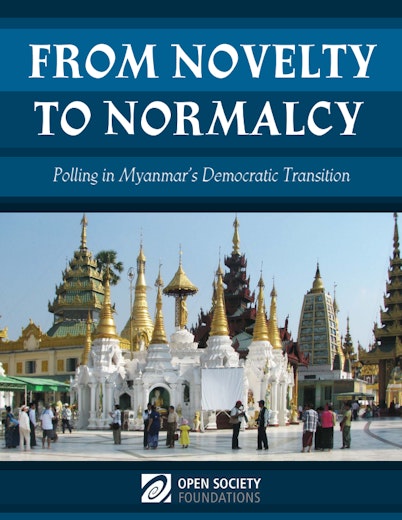The Tricky Practice—and Vast Potential—of Public Polling in Burma
By Kathy Frankovic
In Burma, the official 60-day campaign period for the long-anticipated parliamentary elections should begin in early fall, with the elections expected in November. The Union Election Commission has promised that those elections will be “free, fair, and credible.” This will be the first time in 25 years that all parties, including Aung San Suu Kyi’s National League for Democracy, will fully contest an election.
Clearly, the needs and desires of the public must be taken into consideration as the parties map strategies for contesting elections and earning voter support. But in order to learn what people really want, you have to ask them. That requires incorporating solid, scientific political surveys into party strategy, and into journalism. Such polls can foster closer ties between political parties and the public, and give the public the right information about itself.
But is accurate and effective polling possible in Burma, a country that is only now gradually allowing people to express themselves publicly? The Burma Project and the Think Tank Fund of the Open Society Foundations wanted to find out. In December, Mahar Mangahas of Social Weather Stations in Manila, Ibrahim Suffian of the Merdeka Center in Kuala Lumpur—both with decades of experience conducting polls in their countries—and I traveled to Burma to learn the answer to that question. We interviewed more than 50 individuals representing 31 organizations. In March, our report was published in English and in Burmese.
Survey research in Burma is not as unusual as some people may think. Market-research firms, both locally owned and branches of international corporations, have been operating there for at least two decades. International organizations and foreign governments also collect data, including political opinions, for private use. The veracity of such polling is sometimes questioned, however. Two public polls were conducted in Burma last year, for instance, and were met with criticism from a number of political activists, who disagreed with some of the findings.
However, we found that—despite the shutdown of social sciences in universities—many survey researchers in Burma were highly capable, having been trained outside the country or come to the field from other disciplines, like geology, engineering, or medicine. Those who commissioned research were convinced that the Burmese people were willing to talk and capable of expressing their opinions, even opinions critical of the current government. Despite the fact that existing regulations about asking opinions are burdensome, Burmese researchers have been able to work around them.
Our report points to concerns that survey practitioners must pay attention to: Burma’s multiple languages, the training of interviewers, the protection of confidentiality and privacy in the collection of data, and the problems that accompany sampling in a country as geographically diverse as Burma.
But good surveys are possible, and can be an important part of any democracy. And we believe that good surveys have been conducted in Burma.
Journalists and party leaders in Burma are not always used to this technique, however. We found many making unfounded criticisms of polls, mostly criticisms based on disagreement with the findings, not on any real methodological weakness.
The almost total shutdown of training in the social sciences at Burmese universities during the military regime, and the isolation and even imprisonment of many leaders, has meant that many of those in the opposition lack even the most rudimentary training in political science. That puts the burden on researchers to produce clear reports and interpretations about their polls. They cannot rely on the press or on leaders to understand and report the findings undirected, a task that typically falls to the media in the United States.
In addition, the government and the ruling party seem more attuned than the opposition to the value of polls in improving the relationship between party and public. This should not be the case. Learning what the public needs is how parties in every country can structure their campaigns and win elections.
When I returned to Burma to present the report, I found a great deal of interest in learning more about the polling process, especially from journalists. In addition, the faculty at Yangon University requested information about how to incorporate training into their classes. Survey researchers suggested providing training in ethics for interviewers.
To me, this is a very hopeful sign. Polling is a tool that can help democracy, bringing leaders and the people closer together by providing accurate information about what people want and how they feel about those in power.
I expect to make another trip to Burma in August to meet with journalists, several organizations who train journalists, university faculty, survey research companies, and party activists, before the official campaigning for the expected fall elections begins. I hope this will help make the polling—and in turn, the public—a real part of the election process.
Kathy Frankovic is a leading expert in public opinion polling.


